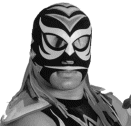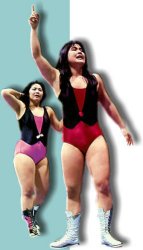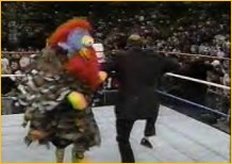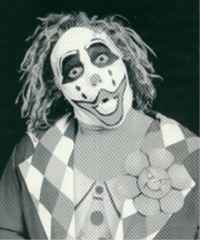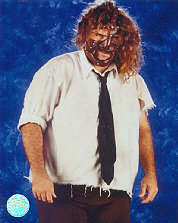|
Surviving
Survivor Series
11-15-02
|
|
|
Chris
Garcia can actually recite this entire article
out loud
in one breath.
And will if provoked.
|
Since
1987, (W)WW(F)E has presented Survivor Series, a major pay-per-view
that has seldom failed to entertain me. Originally conceived
as an event where "teams of five strive to survive", Survivor
Series has changed itself, and a couple of times changed wrestling
forever, but it all started as a great big volley in the battle
between Vince and Jim Crockett, the promoter down in Atlanta.
Crockett
had bet the farm on the first PPV from the NWA (which would
later go on to become the WCW). Planning it for nearly a year,
he chose Starrcade 1987 as the first card. A Thanksgiving
tradition, Starrcade featured stars from around the world
descending on an NWA city for a night of huge matches. Previously,
they had been shown on closed circuit throughout the Mid-Atlantic
territory, but Vince had started showing wrestling on PPV
and making loads of money.
When
Vince got wind of Crockett's idea, he launched a counterstrike:
a series of elimination matches called the Survivor Series.
Then Vince had his masterstroke: force PPV providers to choose
between the NWA show or Vince's latest genius idea. It worked
like a charm: Crockett lost a ton of money, Vince made a ton
of money, and less than a year later, the NWA sold out to
Turner to save it from collapse.
Many
thought the show that Vince put on wouldn't really matter.
Just holding it had done the trick, but the show proved to
be a raving success. The Richfield Coliseum sold 20,000+ seats
and the matches were, on average, very good for the WWF in
that era.
|
|
|
Jumping
Bomb Angels are GO!
|
A tag
team elimination match that went 37 minutes ranked as the
highlight, though a women's match also made a big impact,
as the Jumping Bomb Angels introduced moves that had never
been seen by the WWF audience up to that point. The audience,
both in the arena and at home, came away satisfied with the
event and a tradition was born.
The second
show did not live up to the previous magic. Injuries forced
jobbers like Scott Casey and the Conquistadors onto the show,
and it did not help at all. The tag team elimination match
did rule, mostly due to the presence of Arn Anderson and Tully
Blanchard, The BrainBusters, but the rest of the show couldn't
compete with the over-all quality of the previous year.
They
also did a rare double turn, making Demolition, the resident
Road Warriors rip-offs, into big faces by having the Powers
of Pain, the new Road Warriors rip-offs, take on Mister Fuji
as a manager. Yes, I know it sucks, but I was 13 and thought
that was very cool.
The third
show had little going for it, except for the only Survivor
Series appearance of Zeus (a.k.a. Tiny Lister). The fourth
had two things: An Ultimate Survivor match, where the ones
who had made it through the elimination matches would meet,
a match eventually won by Hogan and Warrior, and of course,
the moment that defined bad ideas in wrestling for nearly
a decade: the Gobbledygooker.
Hector
Guerrero (Brother of Eddy, better known as LazerTron) did
a skit with Mean Gene where he popped out of an egg in a turkey
suit. I am not making this up. The show was decent, but the
shadow of the first show overwhelmed everything.
By the
fifth show, things started to change. First of all, Ric Flair
had arrived in the Fed and had his first WWF pay-per-view
match at SS-V. The match was great, featuring all-time WWF
legends Flair, Roddy Piper, Bret Hart, Davey Boy Smith and
Ted DiBiase. It had a screwy ending, but was the best thing
going in wrestling at the time. The second thing was the first
non-elimination match, a WWF World Title defense where Hogan
dropped the belt to Undertaker due to Flair's interference.
That match led to Tuesday Night In Texas, one of the worst
PPVs ever.
The sixth
show went almost all the way with the change. There was only
one elimination match (a terrible tag match) and a bunch of
very lame matches. The show had been built on the main event,
a world title match between Shawn Michaels and champion Bret
Hart. They delivered a great match, first of two Survivor
Series matches between them.
The Boston
Garden hosted the seventh edition, and turned out an interesting
show. Elimination matches returned, and they did have a great
match where the Smokey Mountain Wrestling tag champions The
Rock 'n Roll Express lost the titles to the Heavenly Bodies
in an excellent match that the audience booed. The other matches
were awful, but they did start the famous Owen vs Bret Hart
feud during one of the elimination matches.
|
|
|
C'mon,
Richie, we all float down here...
|
The 1994
Survivor Series had a terrible match where Jerry Lawler and
midgets defeated Doink and midgets. Somehow, this managed
to be terrible, even with midgets involved. The big news had
to be the fine "Throw in the Towel" match between Mr. Bob
Backlund and Bret Hart. Owen Hart, continuing the feud with
Bret, put on an amazing bit of acting, and convinced Bret's
mother Helen to throw in the towel. The match was great, and
the performance by Owen may have been the best of his great
career.
In 1995,
three elimination matches, a world title match, and the debut
of GoldDust. One of the matches, a Wild Card match, went very
well, and the Women's match, featuring several stars of All
Japan Women's Pro Wrestling, introduced new moves to the fans,
much as the Jumping Bomb Angels had in 1987.
The most
important moment belonged to the main event. Bret Hart challenged
for Diesel's World Title. Towards the finish, the not yet
Big Sexy charged Bret on the ring apron, giving him a big
knee and sending him flying through a ringside table. The
crowd went nuts, and that marked the beginning of modern hardcore
wrestling in the WWF.
The tenth
annual event held three debuts: Flash Funk (aka 2 Cold Scorpio),
the Nation of Domination (complete with White Boy Rappers
formerly known as PG-13), and the first third generation WWF
superstar, Rocky Maivia. Shawn Michaels also dropped the title
to Sycho Sid, in what may have been Sid's best match. Bret
Hart, in his first PPV match following a lengthy lay-off,
took on Steve Austin, then a rising star, in a match that
set the pace for their legendary feud.
Montreal,
November 9th, 1997. That day will forever be remembered as
the date of the double cross, where Vince had Earl Hebner
call for the bell when Shawn Michaels had champion Bret Hart
in the Sharpshooter. Bret had signed to go to WCW, but wouldn't
drop the belt in Canada, so Vince went with an old fashioned
double-cross to strip him of his belt.
Many
say that this moment changed the WWF forever, and certainly
helped turn Vince into the best heel the world has ever known.
1998
used that formula perfectly. Vince had been parading Mick
Foley, in his Mankind guise, as his chosen champion during
the tournament that took place over the course of the show,
but in the finals, when Mankind took on a then face Rocky,
Vince turned on Mankind and had Hebner ring the bell once
he put Mick in the sharpshooter.
Though
many consider the first double-cross a tragedy against the
sport, the second may have been the best piece of booking
that the WWF had ever seen.
1999
was a big year for the WWF, with huge houses and huge feuds
bringing the company to the front of the mainstream. The Survivor
Series that year was about what you would expect, a decent
set of matches, the debut of Kurt Angle, and a three-way title
match that didn't blow me away, but had enough for me to watch
again. 2000 didn't thrill me either, though we did get treated
to the Radicals (Chris Benoit, Eddy Guerrero, Perry Saturn,
and Dean Malenko) in an elimination match and a no contest
between HHH and Steve Austin.
2001:
the year that WCW and WWF came together. The end of the Alliance
angle took place at Survivor Series, with the Rock standing
tall over all, and two WCW belts went away, including the
WCW US title, which had been around since 1975. A solid show,
as most had been, and this had several moments of history
in it.
As a
total, Survivor Series may have to take a back seat to Wrestlemania
as the highlight of the year, but it always produces some
good moments. I highly encourage you, gentle reader, to seek
out the first edition, as well as the 1995 and 1997 editions.
The rest are hit or miss, but I can say you won't be wasting
your time with any of the earlier editions.
|
